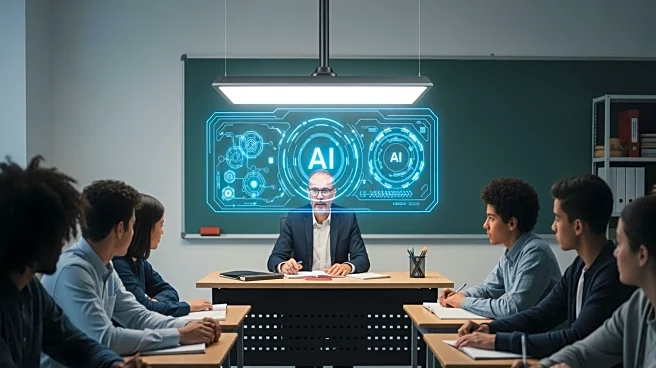What's Happening?
During EdTech Week in New York City, Sarah Johnson, CEO of Teaching Lab, and Abbas Manjee, co-founder of Kiddom, discussed the role of artificial intelligence in education. They emphasized that AI should
not replace teachers but rather work alongside them to enhance classroom dynamics. The partnership between Teaching Lab and Kiddom aims to address the '5 percent problem,' where effective educational tools fail to reach a significant number of students. Johnson and Manjee advocate for integrating AI systems into curricula to improve student outcomes and teacher engagement. They argue that AI can facilitate personalized learning by providing teachers with actionable insights, thus allowing them to focus on creativity and human connection.
Why It's Important?
The integration of AI in education has the potential to transform teaching methods and improve student learning experiences. By focusing on collaboration between technology and educators, the initiative seeks to address the challenges of traditional classroom models that have remained largely unchanged. This approach could lead to more effective teaching strategies and better student engagement, ultimately enhancing educational outcomes. The emphasis on AI as a supportive tool rather than a replacement for teachers highlights the importance of maintaining the human element in education, which is crucial for fostering meaningful teacher-student relationships.
What's Next?
The partnership between Teaching Lab and Kiddom is expected to continue developing AI tools that align with classroom needs. As AI becomes more integrated into educational systems, there will likely be increased collaboration between ed-tech companies and educators to refine these tools. The focus will be on creating cohesive systems that combine curriculum, pedagogy, and technology, ensuring that teachers can effectively utilize AI to enhance their teaching methods. This ongoing development may lead to broader adoption of AI in schools, with potential impacts on educational policy and teacher training programs.
Beyond the Headlines
The ethical implications of AI in education are significant, as they raise questions about data privacy and the role of technology in shaping educational experiences. Ensuring that AI tools are designed to support rather than replace teachers is crucial for maintaining the integrity of the educational process. Additionally, the long-term impact of AI on educational equity must be considered, as access to advanced technology could vary across different schools and districts.









